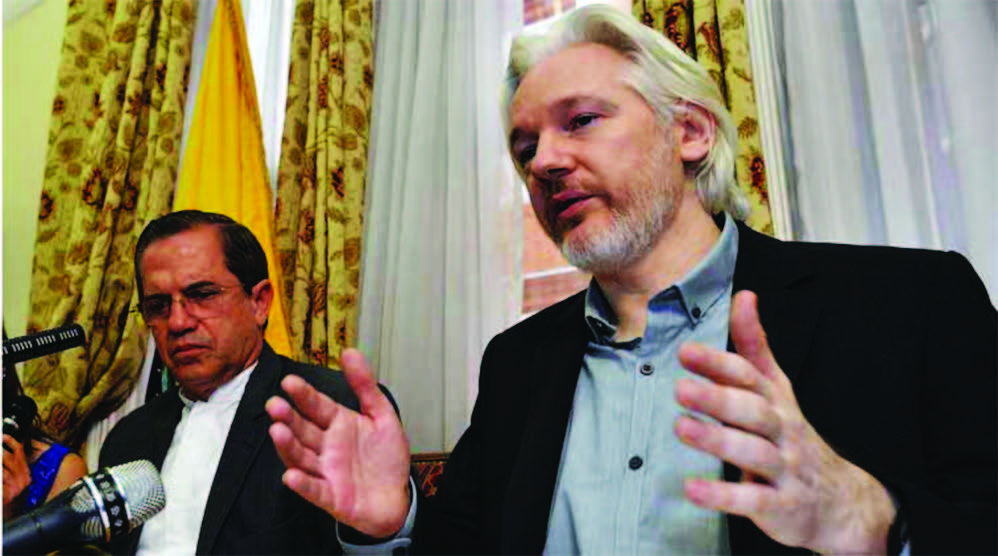
HELSINKI (TIP): Swedish prosecutors on Aug 13 dropped cases of lesser sexual misconduct against WikiLeaks founder Julian Assange but said they still want to question him on accusations of rape made after his visit to Stockholm five years ago.
The Swedish Prosecution Authority said it has been unable to charge the 44-year-old Australian, who escaped a Swedish arrest warrant by taking refuge in the Ecuadorean Embassy in London in 2012, because it has not been possible to question him.
The agency said it has stopped investigating a case of sexual molestation and one of unlawful coercion that expired Thursday, and a third case of sexual molestation, which would have seen its statute of limitations expire on Aug. 18. However, it said Assange — who has not been indicted in Sweden — was still wanted for questioning on allegations of rape that expire in 2020.
Public prosecutor Marianne Ny said she has tried to interview Assange since autumn 2010, but that “he has consistently refused to appear.”
“I still hope, however, that I will be able to arrange for an interview, as there are ongoing negotiations between Sweden and Ecuador,” Ny said in a statement on the agency’s website.
The allegations of sexual misconduct and rape by two women stem from a 2010 visit to Stockholm by Assange who drew crowds to his meetings. After having separate sexual encounters with him, the women went together to the police in Stockholm.
Assange was questioned by the police, denied all allegations, and said he had consensual sexual encounters with the women. Police passed on the case to the prosecutor who ordered his arrest, but he escaped to England.
Assange has refused to go back to Sweden for fear of being extradited to the United States because of an investigation into WikiLeaks’ dissemination of hundreds of thousands of classified US documents. In March, a US federal court confirmed there are “active and ongoing” attempts to prosecute him and WikiLeaks in an investigation involving espionage, conspiracy, and computer fraud.
After failing to fight extradition to Sweden through the British courts, Assange took refuge in June 2012 inside Ecuador’s small diplomatic mission. British police stand guard around the clock ready to detain him if he steps out, in an operation believed to have cost so far some 12 million pounds ($19 million).
Swedish prosecutors initially refused to travel to London to question Assange at the embassy, but changed their minds in March as the statute of limitations approached. However, prosecutors have not heard back from the embassy after attempting to contact it in March and June, according to spokeswoman Karin Rosander.
The Ecuadorean embassy in turn has said that “on no occasion has any representative of the Kingdom of Sweden presented themselves at the embassy in relation to the Assange matter.”
The British government on Thursday protested Ecuador’s refusal “to support legal process” in the case.
“Ecuador must recognize that its decision to harbor Mr. Assange more than three years ago has prevented the proper course of justice,” Hugo Swire, minister in charge of the Foreign and Commonwealth Office, said. “It is completely unacceptable that the British taxpayer has had to foot the bill for this abuse of diplomatic relations.”
Sweden and Ecuador are starting discussions on a general agreement on mutual legal assistance in criminal matters that may permit the questioning of Assange in the embassy, officials from the two countries said.
However, in order to question Assange, Sweden would first need to accept in writing that he has been granted exile by Ecuador and that Ecuadorean jurisdiction applies, Ricardo Patino, who recently stepped down as Ecuador’s foreign minister, was quoted as saying Thursday by the country’s official Andes news agency.
Patino, who remains close to President Rafael Correa, said he believed the talks would be held in early September.
In a statement Thursday, Ecuador’s Foreign Ministry said it welcomes the conversations but “deplores the continued inaction of British and Swedish authorities over nearly 1,000 days of asylum in the embassy, a time during which they all ignored the proposals and calls of Ecuador’s foreign ministry for dialogue.”
Assange said in London that he was “extremely disappointed” at the Swedish prosecutor’s decision to continue an investigation against him.
“There was no need for any of this. I am an innocent man,” he said in a statement. “From the beginning I offered simple solutions. Come to the embassy to take my statement or promise not to send me to the United States.”
Assange’s lawyer in Sweden, Thomas Olsson, said he had expected Thursday’s decision by the prosecutor. “It will not change anything … as the most serious suspicion against him remains,” he said.





Be the first to comment